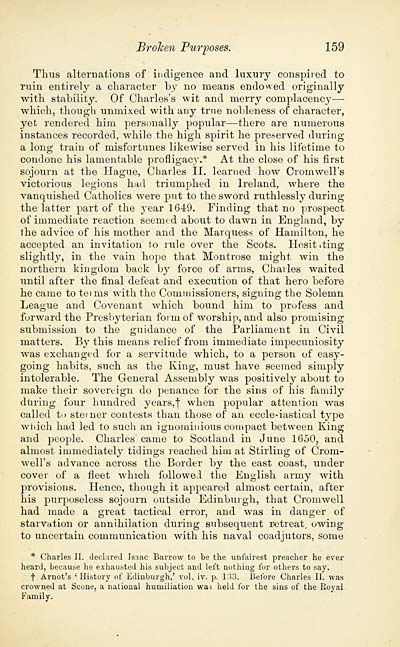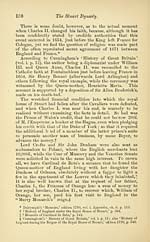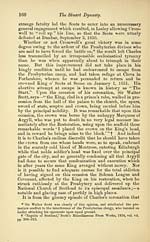Stuart dynasty
(179) Page 159
Download files
Complete book:
Individual page:
Thumbnail gallery: Grid view | List view

Broken Purposes. 159
Thus alternations of indigence and luxury conspired to
ruin entirely a character by no means endowed originally
with stability. Of Charles's wit and merry complacency —
which, though unmixed with any true nobleness of character,
yet rendered him personally popular — there are numerous
instances recorded, while the high spirit he preserved during
a long train of misfortunes likewise served in his lifetime to
condone his lamentable profligacy.* At the close of his first
sojourn at the Hague, Charles II. learned how Cromwell's
victorious legions had triumphed in Ireland, where the
vanquished Catholics were put to the sword ruthlessly during
the latter part of the year 1649. Finding that no prospect
of immediate reaction seemed about to dawn in England, by
the advice of his mother and the Marques.s of Hamilton, he
accepted an invitation to rule over the Scots. Hesit<ting
slightly, in the vain hope that Montrose might win the
northern kingdom back by force of arms, Charles waited
until after the final defeat and execution of that hero before
he came to teims with the Commissioners, signing the Solemn
League and Covenant which bound him to profess and
forward the Presbyterian form of worship, and also promising
submission to the guidance of the Parliament in Civil
matters. By this means relief from immediate impecuniosity
was exchanged for a servitude which, to a person of easy-
going habits, such as the King, must have seemed simply
intolerable. The General Assembly was positively about to
make their sovereign do penance for the sins of his family
during four hundred years, f when popular attention was
called to sterner contests than those of an ecclesiastical type
which haci led to such an ignominious compact between King
and people. Charles came to Scotland in June 1650, and
almost immediately tidings reached him at Stirling of Crom-
well's advance across the Border by the east coast, under
cover of a fleet which followed the English army with
provisions. Hence, though it appeared almost certain, after
his purposeless sojourn outside Edinburgh, that Cromwell
had made a great tactical error, and was in clanger of
starvation or annihilation during subsequent retreat, owing
to uncertain communication with his naval coadjutors, some
* Charles II. declared Isaac Barrow to be the unfairest preacher he ever
heard, because he exhausted his subject and left nothing for others to say.
7 Arnot's ' History of Edinburgh,' vol. iv. p. l'V3. Before Charles II. was
crowned at Scone, a national humiliation was held for the sins of the Royal
Family.
Thus alternations of indigence and luxury conspired to
ruin entirely a character by no means endowed originally
with stability. Of Charles's wit and merry complacency —
which, though unmixed with any true nobleness of character,
yet rendered him personally popular — there are numerous
instances recorded, while the high spirit he preserved during
a long train of misfortunes likewise served in his lifetime to
condone his lamentable profligacy.* At the close of his first
sojourn at the Hague, Charles II. learned how Cromwell's
victorious legions had triumphed in Ireland, where the
vanquished Catholics were put to the sword ruthlessly during
the latter part of the year 1649. Finding that no prospect
of immediate reaction seemed about to dawn in England, by
the advice of his mother and the Marques.s of Hamilton, he
accepted an invitation to rule over the Scots. Hesit<ting
slightly, in the vain hope that Montrose might win the
northern kingdom back by force of arms, Charles waited
until after the final defeat and execution of that hero before
he came to teims with the Commissioners, signing the Solemn
League and Covenant which bound him to profess and
forward the Presbyterian form of worship, and also promising
submission to the guidance of the Parliament in Civil
matters. By this means relief from immediate impecuniosity
was exchanged for a servitude which, to a person of easy-
going habits, such as the King, must have seemed simply
intolerable. The General Assembly was positively about to
make their sovereign do penance for the sins of his family
during four hundred years, f when popular attention was
called to sterner contests than those of an ecclesiastical type
which haci led to such an ignominious compact between King
and people. Charles came to Scotland in June 1650, and
almost immediately tidings reached him at Stirling of Crom-
well's advance across the Border by the east coast, under
cover of a fleet which followed the English army with
provisions. Hence, though it appeared almost certain, after
his purposeless sojourn outside Edinburgh, that Cromwell
had made a great tactical error, and was in clanger of
starvation or annihilation during subsequent retreat, owing
to uncertain communication with his naval coadjutors, some
* Charles II. declared Isaac Barrow to be the unfairest preacher he ever
heard, because he exhausted his subject and left nothing for others to say.
7 Arnot's ' History of Edinburgh,' vol. iv. p. l'V3. Before Charles II. was
crowned at Scone, a national humiliation was held for the sins of the Royal
Family.
Set display mode to:
![]() Universal Viewer |
Universal Viewer | ![]() Mirador |
Large image | Transcription
Mirador |
Large image | Transcription
Images and transcriptions on this page, including medium image downloads, may be used under the Creative Commons Attribution 4.0 International Licence unless otherwise stated. ![]()
| Histories of Scottish families > Stuart dynasty > (179) Page 159 |
|---|
| Permanent URL | https://digital.nls.uk/94819914 |
|---|
| Description | A selection of almost 400 printed items relating to the history of Scottish families, mostly dating from the 19th and early 20th centuries. Includes memoirs, genealogies and clan histories, with a few produced by emigrant families. The earliest family history goes back to AD 916. |
|---|

